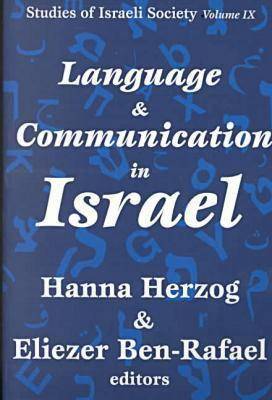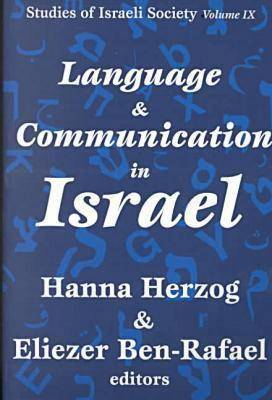
En raison d'une grêve chez bpost, votre commande pourrait être retardée. Vous avez besoin d’un livre rapidement ? Nos magasins vous accueillent à bras ouverts !
- Retrait gratuit dans votre magasin Club
- 7.000.000 titres dans notre catalogue
- Payer en toute sécurité
- Toujours un magasin près de chez vous
En raison de la grêve chez bpost, votre commande pourrait être retardée. Vous avez besoin d’un livre rapidement ? Nos magasins vous accueillent à bras ouverts !
- Retrait gratuit dans votre magasin Club
- 7.000.0000 titres dans notre catalogue
- Payer en toute sécurité
- Toujours un magasin près de chez vous
Description
The sociology of language and the sociology of communication are well-established fields in Israeli sociology, but it is only recently that their departments have grown vigorously in Israel's various universities. They are long-standing, respected disciplines in international sociology, as is evidenced by their academic associations and the reputation of their specialized journals. Language and Communication in Israel, the ninth volume of the Studies of Israeli Society series, presents a broad range of the various approaches and questions that preoccupy Israel's sociologists of language and communication.The collection starts with studies that focus on the presence of language and communication in daily life. Subsequent chapters analyze the relation of language and communication to social and cultural pluralism. Also included is a study of linguistic and communication aspects of politics and elections. A special chapter consists of an examination of the role of language and communication in the Israeli-Arab conflict and an analysis of the intermingling of mass media and the state.In their introduction, the editors discuss each of the chapters under the guidance of a key question, namely, the significance of the studies presented for the profile of the Israeli society, on the one hand, and of the Israeli scholarship of these fields, on the other. Two concluding chapters are also included in this landmark volume, one by Joshua A. Fishman and one by Elihu Katz. Each author emphasizes what he thinks is of major importance to the future of the sociology of language and the sociology of communication. Language and Communication in Israel is an enlightening study of two growing fields. It is essential reading for scholars of linguistics and communications as well as for sociologists and Israeli studies specialists. Hanna Herzog is associate professor in the department of sociology at Tel-Aviv University. She is the author of Political Ethnicity, Contest of Symbols, Realistic Women, and Gendering Politics.
Spécifications
Parties prenantes
- Auteur(s) :
- Editeur:
Contenu
- Nombre de pages :
- 670
- Langue:
- Anglais
- Collection :
Caractéristiques
- EAN:
- 9781560009986
- Date de parution :
- 01-10-00
- Format:
- Livre broché
- Format numérique:
- Trade paperback (VS)
- Dimensions :
- 152 mm x 229 mm
- Poids :
- 883 g

Les avis
Nous publions uniquement les avis qui respectent les conditions requises. Consultez nos conditions pour les avis.






